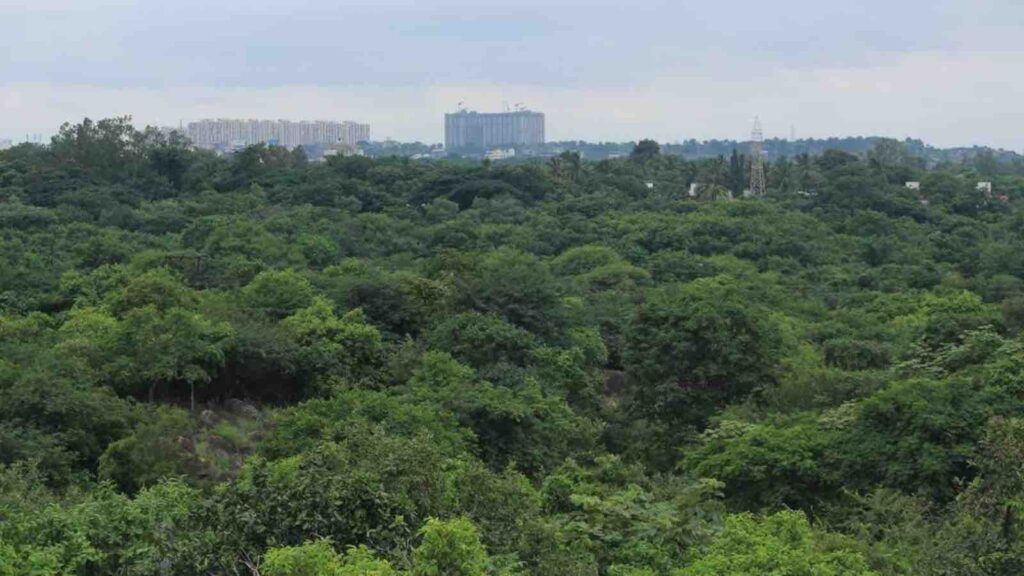Over 10,000 trees cut in Telangana’s Kancha Gachibowli—an urban forest razed for IT parks, despite massive student protests.
HYDERABAD — For weeks, the University of Hyderabad resembled less a center of learning and more a site of civil unrest. Students clashed with police as they protested the systematic destruction of a 400-acre urban forest in the Kancha Gachibowli area—an increasingly rare pocket of biodiversity in the sprawling IT capital of Telangana.
RELEVANT SUSTAINABLE GOALS




What began as student-led demonstrations against the Telangana State Industrial Infrastructure Corporation (TGIIC) soon escalated into a full-blown political and legal confrontation. Bulldozers entered the forest in late March. Trees began falling. By mid-April, as tensions peaked, the Supreme Court of India stepped in with a critical intervention: all tree felling must cease until further notice. The court demanded the Telangana government justify its urgency, and whether any environmental assessments had been conducted at all.
But by then, much of the damage was done. “Over 10,000 of the roughly 17,700 trees in the area have already been cut,” said GIS analyst Sai Krishna. The destruction, he added, began even as court hearings and protests were ongoing.
A Biodiversity Treasure Trove at Risk
Kancha Gachibowli isn’t just open land. According to documentation compiled by Save City Forest, a local citizen-led collective, the site supports over 734 species of flowering plants, 220 species of birds, 15 reptiles, and 10 mammals. It functions as a breeding ground, habitat, and nursery for wildlife—making it a vital ecological node within an increasingly built-up city.
Environmentalists warn that continued degradation will exacerbate Hyderabad’s water crisis, increase temperatures, and reduce air quality. “Destroying this ecosystem isn’t just an environmental loss—it’s a public health crisis in the making,” said public policy expert Donthi Narasimha Reddy. He called on the government to use existing legal mechanisms to formally declare Kancha Gachibowli a forest.
The land in question once belonged to the University of Hyderabad and was originally designated as grazing land—“kancha” in Telugu. In 2004, it was leased to IMG Academies for a sports complex, sparking a decades-long legal battle. In 2024, the state government reclaimed the land, only to quickly allocate it to TGIIC for development and auction.
Despite lacking a master plan or environmental assessments, the government forged ahead, citing economic imperatives. A June 2024 Government Order authorized the transfer of land to TGIIC, waiving stamp duties and enabling auction at market rates. The Chief Minister Revanth Reddy claimed the site would attract ₹50,000 crore (approximately USD 6 billion) in investment and create 500,000 jobs. Yet, no supporting documentation has been made publicly available.
A Protest Met With Force, Then Silence
Students, faculty, and alumni have staged protests, filed public interest litigations, and sought direct dialogue with government officials. Their calls have been met with detentions, lathi charges, and little transparency. Even after the Telangana High Court orally directed tree felling to stop on April 2, shrubs were reportedly burned and more trees cut down.
A day later, a delegation of 14 civil society leaders met with ministers to plead for the forest’s protection—again, to no effect. “The destruction continuing in the face of public outcry shows a clear disregard for environmental governance,” said Kiran Kumar Vissa, a member of the delegation.
Forest or Real Estate? The Legal Grey Zone
Despite being classified historically as grazing land, the ecosystem has regenerated into a de facto forest. But without official forest designation, it exists in a legal limbo—vulnerable to swift reclassification and development. Environmentalists argue that while India’s environmental laws provide tools for protection, the political will appears absent.
Adding to the legal complexity, the Union Ministry of Environment, Forest and Climate Change has demanded an explanation from the Telangana Forest Department, invoking the Indian Forest Act and Wildlife Protection Act. Whether this federal push will translate into enforcement on the ground remains unclear.
The Supreme Court has scheduled the next hearing for April 16. Until then, no further tree cutting is permitted. But activists remain skeptical. “Time is not on our side. Every hour, more of the forest disappears,” said Lubna Sarwath, an urban activist and Congress party member.
Whether Kancha Gachibowli becomes Hyderabad’s first people-led conservation success—or just another statistic in the country’s vanishing green spaces—may well hinge on what happens in the courtroom next week. For now, the battle for the forest continues, rooted in a deeper struggle between ecological preservation and economic expansion.
Lead image courtesy of Special arrangement. Verdant expanse of Kancha Gachibowli.
You may also be interested in :
How Google Earth Is helping To Save Southeast Asia’s Sun Bears




